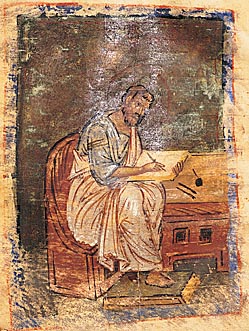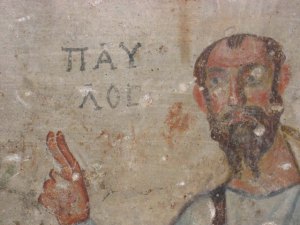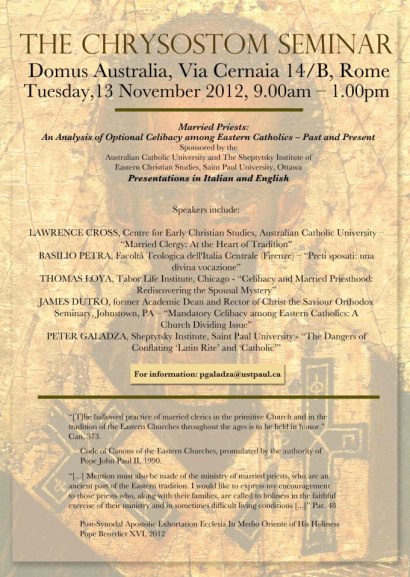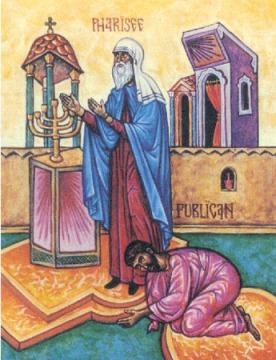By Thomas Seraphim Hamilton
 Romans 9 has confused many Western interpreters, especially since the era of the Reformation. Calvinists point to it as a plain example of the Apostle Paul teaching “double predestination” that is, the idea that God, from all eternity, has chosen (on no condition of faith or works) a certain number of individuals to be saved, and has condemned the rest (again, on no prior condition of faith or works) to eternal damnation. Non-Calvinist interpreters generally see Romans 9 as primarily a discussion of national election, concerning the fate of Israel, the Church, and the Gentile nations, rather than any specific individuals. While this reading has merit, it is incomplete and does not explain the entirety of the passage. What I seek to do, then, is to walk through Romans 9, verse by verse, paying attention to every word that the Apostle writes, and show that it does not, in fact, support Reformed theology.
Romans 9 has confused many Western interpreters, especially since the era of the Reformation. Calvinists point to it as a plain example of the Apostle Paul teaching “double predestination” that is, the idea that God, from all eternity, has chosen (on no condition of faith or works) a certain number of individuals to be saved, and has condemned the rest (again, on no prior condition of faith or works) to eternal damnation. Non-Calvinist interpreters generally see Romans 9 as primarily a discussion of national election, concerning the fate of Israel, the Church, and the Gentile nations, rather than any specific individuals. While this reading has merit, it is incomplete and does not explain the entirety of the passage. What I seek to do, then, is to walk through Romans 9, verse by verse, paying attention to every word that the Apostle writes, and show that it does not, in fact, support Reformed theology.
Before we begin, we must establish an important principle of Pauline exegesis. The Holy Apostle Paul was a devout Jew. He had studied under masterful scholars of Torah (notably Rabbi Gamaliel) and had a firm belief that the one creator God had chosen Israel, the Family of Abraham, to be His special people. To this end, he spent his life studying Moses, the Prophets, and the Psalms. His understanding of them was not confined to a few select proof-texts. He understood each book, and each passage within each book, in the context of the whole sweep of Scripture. The revelation that Jesus was Israel’s Messiah and that the redemption of Israel took place through the death and resurrection of Jesus fundamentally reshaped Paul’s entire outlook, but it did not make him think any less of the Hebrew Scriptures. Rather, it forced him to search them all the more and find out what he had missed. Let us be very careful, then, not to assert that Paul takes select texts from the Old Testament and uses them without regard to the surrounding context.
Romans 9 is absolutely drenched with Old Testament Scripture. In order to discover how carefully Paul used the Old Testament, we will take a look at a single passage before moving step by step through the entire argument. In Romans 9:27, St. Paul quotes the Prophet Isaiah as saying, “Though the number of the sons of Israel be as the sand of the sea, only a remnant will be saved.” This is a quotation from Isaiah 10:22. The immediately preceding verse says that “A remnant, the remnant of Jacob, to the mighty God.” This title for God, “Mighty God” is used only three times in the entire Hebrew Bible, two of them in the Book of Isaiah. The one other use in Isaiah is found in 9:6, where the Prophet writes, “For to us a child is born, to us a son is given; and the government shall be upon his shoulder, and his name shall be called Wonderful Counselor, Mighty God, Father Forever, Prince of Peace. Of the increase of his government and of peace there will be no end, on the throne of David and over his kingdom, to establish it and to uphold it with justice and with righteousness from this time forth and forevermore. The zeal of the Lord of hosts will do this.” The point being made here is that “mighty God” is a title for the Son of David, the Messiah of Israel. This same title is then used to describe the one to whom a remnant of Jacob will hearken to. In other words, only a remnant of Jacob will believe in the Messianic King of Israel. Paul’s selection of Isaiah 10:22 to make his point is well made indeed.
Now that we have established that Paul uses the Old Testament with regard to both the narrow and broad context of the verses quoted, let us look at Romans 9 within its own context. The Letter to the Romans is a symphony in four parts. The first part is Romans 1-3. In Romans 1, Paul demonstrates that the nations of the world are deep in sin, and the wrath of God is poured out on them all. Interestingly, Paul understands the wrath of God to be the natural degeneracy of human society due to sin, the loss of the Divine Image in man. In Romans 2, Paul answers the claim of the Jew. The Jews know that the people of Israel was the people through whom God promised to heal the world, but Paul answers them back. They too, are in Adam. Indeed, the name of God is blasphemed among the Gentiles because of them. How then can God’s single plan to redeem the world go forward? How can God be righteous if His plan has failed? It hasn’t failed, says Paul. It is going forward, but in a way that is unexpected. In Romans 3, Paul says that the righteousness of God (by which he means the faithfulness of God to his single plan to redeem the world through Israel) has been unveiled in the faithfulness of the Messiah, Jesus, whom God set forth as the mercy seat of faithfulness (the place where God and man meet and man is cleansed of sin) in His blood. This is how God’s plan through Israel for the world has been revealed. This is the way that it goes forward. God has not healed the world through Torah, but through the faithfulness of the Messiah. Now, all who are obedient to the Messiah are renewed in knowledge after the Image of their Creator, which is the meaning of the word “justified.” Justification takes place not through Torah, but through faith in Messiah Jesus.
Paul then retells the entire history of Israel through the lens of the Messianic work of Jesus. He looks at Abraham, the Father of the Covenant People. Abraham himself, when God promised him a great worldwide family, was not made righteous by Torah (indeed, Torah had not been given yet!), but by faith in God. At the very moment when the family was promised, the benefits of the family (understand here that the Family of Abraham was to be a family which bore the Divine Image corrupted by Adam) were realized not through the Torah, but through Abraham’s unyielding trust in God. How then could membership in the family be defined by works of Torah? Indeed, all people, Jew and Gentile, may become members of the Abrahamic Family by following in the footsteps of Abraham. In Romans 5, Paul moves from Abraham to the next stage in Israel’s history- bondage. The true bondage, though, is not physical labor in Egypt, but bondage in Adam. All men are “in Adam” and are enslaved to sin. The Messiah is the true Moses, the true liberator, because through Messiah, we are liberated from bondage to sin (which is enforced by personal, malevolent forces known as the powers and authorities) and made slaves to righteousness. In Romans 6, Paul looks at this Messianic Liberation, seeing Baptism as that which fulfilled the crossing of the Red Sea. It is through Baptism, teaches the Apostle, that we are liberated from slavery to sin. In Romans 7, Paul then looks at what was given after Israel crossed the Red Sea- Torah. What is the purpose of the Torah? What does it do in the new covenant? The Apostle carefully weaves his argument, demonstrating that Torah was never intended to mark out the people of God or lead them to realize the benefits of the Abrahamic Family. Rather, Torah was given so that Israel might know sin and the depth of her sinfulness. Then, in Romans 8, Paul looks at the glorious entrance of the people of Israel into the Promised Land, led by the Spirit of God, who enables them to obey. This time, however, it is not a tiny strip of land in the Middle East entered by a single race. Rather, it is the single Family of Abraham, comprising Jews and Gentiles, renewed in Baptism, filled with the Spirit, obeying in joy, that enters the true promised Land. The true land of Promise is the entire Creation, the whole cosmos, renewed and transfigured by the grace of God, inhabited by the Family of God, living in bodies redeemed after the likeness of the resurrection of the Messiah.
Romans 9-11 is the third act of the symphony. It is the Apostle’s scriptural defense of the above. “That’s all well and good, Paul”, says the interlocutor. “But is that really God’s plan? If Jews and Gentiles are now equal members of the family of God, it seems to me that God has not fulfilled, but broken His covenant with Israel.” And this is where the argument begins.
(Romans 9:6-9) But it is not as though the word of God has failed. For not all who are descended from Israel belong to Israel, and not all are children of Abraham because they are his offspring, but “Through Isaac shall your offspring be named.” This means that it is not the children of the flesh who are the children of God, but the children of the promise are counted as offspring. For this is what the promise said: “About this time next year I will return and Sarah shall have a son.”

One of the earliest icons of St. Paul from a cave in Ephesus, Asia Minor.
God has been faithful to Israel, but you don’t know what Israel is, argues the Apostle. Not all who claim physical descent from Israel are really members of Israel. In order to prove this, Paul shows that Abraham’s true offspring were not named through Ishmael, but through Isaac. It is important to note here that Paul is not talking about the personal election of Ishmael or Isaac to salvation, damnation, or even covenant membership. Indeed, Ishmael was circumcised, demonstrating Abraham’s understanding that he was a member of the covenant. No, this is talking particularly about the election of their offspring. The promise of Israel was to go through Isaac. Let us not forget the purpose of Abraham’s calling. Abraham was called so that “all the families of the Earth” would be blessed in him. (Genesis 12:3) Paul understood this to be the very substance of the gospel, calling this proclamation in Genesis 12 “the gospel preached beforehand.” (Galatians 3:8) The promise was going through the family of Isaac, not the family of Ishmael. The last time that Paul used this word “counted” (9:8) was in Romans 4, where Paul teaches that Abraham was counted as righteous through his faith, so that all who are of the faith of Abraham would be counted righteous along with him. This is a return to that theme. The genuine sons of Abraham are the ones through whom and in whom the promise of Abraham would be fulfilled. Not all who come from Abraham’s flesh are genuinely his children. Rather, it is those who are of the promise who are the genuine children.
(Romans 9:10-13) And not only so, but also when Rebecca had conceived children by one man, our forefather Isaac, though they were not yet born and had done nothing either good or bad–in order that God’s purpose of election might continue, not because of works but because of his call– she was told, “The older will serve the younger.” As it is written, “Jacob I loved, but Esau I hated.”
This is where it becomes very important to examine the contexts of the Old Testament citations used by the Apostle Paul. First, the Apostle cites a passage from Genesis 25. The text says, “And the Lord said to her, “Two nations are in your womb, and two peoples from within you shall be divided; the one shall be stronger than the other, the older shall serve the younger.” (Genesis 25:23) The discussion here is of the election of the nation coming from Jacob and the nation coming from Esau. Esau, in his own life, did not personally serve Jacob. The sons of Esau, the nation of Edom, was however subordinated to the sons of Jacob, the nation of Israel. This demonstrates yet again that Paul is not discussing the personal election to salvation or damnation of Jacob or Esau, but is rather discussing which family the promise will pass through. The “purpose of election” is that purpose discussed in Genesis 12:3, that God would bless and redeem the whole world through Israel. God had chosen to bless the world through the family of Jacob, rather than the family of Esau. The context of the other quotation of Scripture confirms this point. Paul is quoting from Malachi 1, which says, “‘I have loved you,’ says the Lord. But you say, ‘How have you loved us?’ ‘Is not Esau Jacob’s brother?’ declares the Lord. ‘Yet I have loved Jacob but Esau I have hated. I have laid waste his hill country and left his heritage to jackals of the desert.'” (Malachi 1:2-3) Here, it is evident that God is not discussing the fates of Jacob and Esau as individuals, but is rather using them as figures representing the nations which they bore- Israel and Edom. The meaning of the words “love” and “hate” then become plain. By “love”, God means that He has covenanted with Israel, and by “hate” God means that He has not covenanted with Esau. The broader context of this passage provides additional support to the idea that the Apostle is not discussing personal salvation, but the choice of which family to pass the promise through. Malachi writes “A son honors his father, and a servant his master. If then I am a father, where is my honor? And if I am a master, where is my fear? says the Lord of hosts to you, O priests, who despise my name. But you say, ‘How have we despised your name?’ By offering polluted food upon my altar. But you say, ‘How have we polluted you?’ By saying that the Lord’s table may be despised. When you offer blind animals in sacrifice, is that not evil? And when you offer those that are lame or sick, is that not evil? Present that to your governor; will he accept you or show you favor? says the Lord of hosts.” (1:6-8) In the very context where God discusses His election of Jacob’s family rather than Esau’s, He accuses Israel of being unfaithful to her God! To read Romans 9:10-13, then, as “Jacob I have saved, but Esau I have damned” is utterly unwarranted by the text of Scripture.
(Romans 9:14-15) What shall we say then? Is there injustice on God’s part? By no means! For he says to Moses, “I will have mercy on whom I have mercy, and I will have compassion on whom I have compassion.”
The question of “injustice” does not mean “Is God unjust to unconditionally elect some to salvation and unconditionally condemn others to damnation?” It means “Is God unfaithful, then, to His covenant with Abraham?” This can be understood by looking at the context of the passage quoted by the Apostle. Moses records, “‘For how shall it be known that I have found favor in your sight, I and your people? Is it not in your going with us, so that we are distinct, I and your people, from every other people on the face of the earth?’ And the Lord said to Moses, ‘This very thing that you have spoken I will do, for you have found favor in my sight, and I know you by name.’ Moses said, ‘Please show me your glory.’ And he said, ‘I will make all my goodness pass before you and will proclaim before you my name ‘The Lord.’ And I will be gracious to whom I will be gracious, and will show mercy on whom I will show mercy.'” Moses asks God to confirm that Israel is truly His people by the display of the Divine Glory. The Lord God obliges, confirming that He is faithful to His covenant with Israel. The point, then, is this. Even as God chose to pass the promise through Isaac’s family, not Ishmael’s, and even as He chose Jacob’s family, not Esau’s, He is still faithful to that original covenant with Abraham. His choice to pass the promise through particular families does not detract from His covenant faithfulness. The point is certainly not “God is free to unconditionally elect some individuals and unconditionally damn others.” The point is that the covenant has never been broken, even as all the physical sons of Abraham have not inherited the covenant. Furthermore, this quotation of Exodus 33 actually looks forward to Romans 11:32, where the Apostle writes, “For God has consigned all to disobedience, so that He may have mercy on all.” The point of this whole argument is precisely not the limitation of God’s mercy. It is that God is merciful towards all! The promise looked forward to the day when both Jews and Gentiles would freely benefit from the covenant with Abraham.
(Romans 9:16) So then it depends not on human will or exertion, but on God, who has mercy.
This text has often been used to prove monergism over and against synergism, because it allegedly demonstrates that human freedom has absolutely no role in salvation. Actually, this constitutes a failure to read Paul as a Jew. There was a common idiom in the Hebrew Scriptures known as the “negation idiom.” This meant that when one aspect of something was to be emphasized, it would be phrased as a “this, not this”, even though both components were actually present. For example, God says through the Prophet Hosea, “For I desire steadfast love and not sacrifice, the knowledge of God rather than burnt offerings.” (Hosea 6:6) We know, in fact, that both love and sacrifice are essential, for the Apostle Paul himself affirms that there is no forgiveness apart from the shedding of blood (Hebrews 9:22). Or note what God said through Jeremiah, “For in the day that I brought them out of the land of Egypt, I did not speak to your fathers or command them concerning burnt offerings and sacrifices. But this command I gave them: ‘Obey my voice, and I will be your God, and you shall be my people. And walk in all the way that I command you, that it may be well with you.'” (Jeremiah 7:22-23) We know that God in fact did both. These are “negation idioms” and they are peculiar to Hebrew thought. Paul, as a Jew writing against the backdrop of the Jewish Scriptures, follows this precise format in Romans 9:16. The passage fails as a proof for absolute monergism.
(Romans 9:17-21) For the Scripture says to Pharaoh, “For this very purpose I have raised you up, that I might show my power in you, and that my name might be proclaimed in all the earth.” So then he has mercy on whomever he wills, and he hardens whomever he wills. You will say to me then, “Why does he still find fault? For who can resist his will?” But who are you, O man, to answer back to God? Will what is molded say to its molder, “Why have you made me like this?” Has the potter no right over the clay, to make out of the same lump one vessel for honored use and another for dishonorable use?
Let us take this passage one bit at a time. First, the example of Pharaoh is brought forth. What must be recognized here is that Pharaoh is the quintissential example of the person who attacks the covenant people and resists the purposes of the covenant God. What happens to the person who resists the purposes of the covenant God? They are hardened. This pattern has already been discussed in Romans 1. The Apostle writes first of the sin of the nations (1:21-23) and then says “therefore God gave them up” (1:24) The resistance is logically prior to the hardening. The hardening is not unconditional, as the Calvinist would claim. This pattern also appears in the Exodus narrative itself. In Exodus 8:15 and 8:32, Pharaoh is the one who hardens his own heart. It is only from 9:12 onwards that God is described as hardening Pharaoh’s heart. This pattern is confirmed by the Old Testament allusion that Paul is using. When Paul describes the potter and the clay, he is alluding to Jeremiah 18, which says “So I went down to the potter’s house, and there he was working at his wheel. And the vessel he was making of clay was spoiled in the potter’s hand, and he reworked it into another vessel, as it seemed good to the potter to do. Then the word of the Lord came to me: ‘O house of Israel, can I not do with you as this potter has done? declares the Lord. Behold, like the clay in the potter’s hand, so are you in my hand, O house of Israel.'” (Jeremiah 18:3-6) Note here that the potter is working the clay for His own purposes, and the clay is then “spoiled in the potter’s hand.” It not that the potter has purposed from the very beginning to destroy the clay. It is instead that the potter is forming the clay, but the clay is resistant. Because it is spoiled in the potter’s hand, he reworks it for another purpose. It is then made clear that the “clay” is not assorted individual Jews and Gentiles. It is instead the “house of Israel” which has spoiled and been reworked. The point, then, is that the Jewish people have become like Pharaoh. They have spoiled in the potter’s hand and resisted the purposes of the covenant God. God then uses them for another purpose. Like Pharaoh was used to make the name of Israel’s God known to the nations, so also the Jewish rejection of God is used to bring the Gentiles into covenant relationship with God. This is why Paul later says, “So I ask, did they stumble in order that they might fall? By no means! Rather through their trespass salvation has come to the Gentiles, so as to make Israel jealous.” (Romans 11:11)
(Romans 9:22-23) Although God desired to show his wrath and to make known his power, he endured with much patience vessels of wrath prepared for destruction, in order to make known the riches of his glory for vessels of mercy, which he has prepared beforehand for glory– [translation of Dr. Ben Witherington]
This passage makes perfect sense in light of everything that has come before. God chose to bless the world through Abraham’s family. He then determined that the promise to bless the world would pass through Isaac’s family, then Jacob’s family. Throughout history, Jacob’s family resisted the purposes of the covenant God, yet the Lord endured them and did not destroy them, in order to bring His purposes to pass. His purpose was to “make known the riches of his glory for vessels of mercy.” The “vessels of wrath” are not individual reprobates, but the unfaithful Jewish people. The word “vessel” is lifted from Jeremiah 18, which is discussing the unfaithfulness and reworking of the house of Israel. God endured their unfaithfulness to make known His faithfulness. Through the family of Jacob, He brought forth the son of Israel, Jesus the Messiah, and the promise is realized in the Messiah. As the promise has been realized through Him, all who are loyal to Him now constitute the “children of the promise” the true people of Israel.
(Romans 9:24-28) even us whom he has called, not from the Jews only but also from the Gentiles? As indeed he says in Hosea, “Those who were not my people I will call ‘my people,’ and her who was not beloved I will call ‘beloved.'” “And in the very place where it was said to them, ‘You are not my people,’ there they will be called ‘sons of the living God.'” And Isaiah cries out concerning Israel: “Though the number of the sons of Israel be as the sand of the sea, only a remnant of them will be saved, for the Lord will carry out his sentence upon the earth fully and without delay.”
These two texts are woven together very carefully. The first text from Hosea is a quotation from Hosea 2:23. It is prophesying the coming redemption of Israel, when God will renew the covenant and render Israel His people again. This is because in Hosea 1:9-10 (the second text quoted by Paul), God declared that Israel is “not my people” because of their unfaithfulness. One day, says Hosea, Israel will be God’s people again. the Apostle juxtaposes this with a citation from Isaiah 10, where the Prophet says, “A remnant will return, the remnant of Jacob, to the mighty God. For though your people Israel be as the sand of the sea, only a remnant of them will return. Destruction is decreed, overflowing with righteousness.” (Isaiah 10:21-22) It was acceptable in antiquity to slightly alter the quotation of a text so as to make clearer the point you are making (there was no such thing as a quotation mark, after all.) Where Isaiah says “your people Israel”, the Apostle Paul says “the sons of Israel.” This hearkens back to what St. Paul wrote in Romans 9:6: “Not all who are descended from Israel belong to Israel.” The point is that when God renews His covenant with Israel, only a remnant of Jacob’s ethnic descendants will hearken to the “mighty God”, who, remember, has been defined in Isaiah 9:6-7 as the Messianic Son of David. When God redeems Israel, it won’t be only Jews who are called “sons of the living God.” When God judges the Earth, many of those physically descended from Israel will not inherit the kingdom of God.
(Romans 9:29) And as Isaiah predicted, “If the Lord of hosts had not left us offspring, we would have been like Sodom and become like Gomorrah.”
The citation here is from Isaiah 1:9, where the Prophet writes, “Your country lies desolate; your cities are burned with fire; in your very presence foreigners devour your land; it is desolate, as overthrown by foreigners. And the daughter of Zion is left like a booth in a vineyard, like a lodge in a cucumber field, like a besieged city. If the Lord of hosts had not left us a few survivors, we should have been like Sodom, and become like Gomorrah.” (Isaiah 1:7-9) This is a continuation of Paul’s discussion of when the Lord carries out His sentence on the Earth. The Apostle modifies “survivors” to become “offspring.” God is faithful, says Paul, because there are still genuine Israelites among the Jewish people. There is still a righteous remnant. (9:27, 11:5) The others, those who sought righteousness by the Torah, have been left desolate, estranged from the covenant, judged along with Sodom and Gomorrah.
(Romans 9:30-33) What shall we say, then? That Gentiles who did not pursue righteousness have attained it, that is, a righteousness that is by faith; but that Israel who pursued a law that would lead to righteousness did not succeed in reaching that law. Why? Because they did not pursue it by faith, but as if it were based on works. They have stumbled over the stumbling stone, as it is written, “Behold, I am laying in Zion a stone of stumbling, and a rock of offense; and whoever believes in him will not be put to shame.”
This brings Romans 9 to a close, though the argument continues to press on in 10-11. For now, however, we will conclude here. The “righteousness” is that same righteousness that was counted to Abraham when he believed that God would create a massive family through his own offspring. (Genesis 15:1-6, Romans 4:1-4) God had chosen to renew the Divine Image in man through the Family of Abraham (as is recognized in Jewish texts like Jubilees), and he does this through inspiring a man to “live by faith.” (Habbakuk 2:4, Romans 1:17-18) It is this life of faith that marks a person out as a son of Israel, a genuine child of promise, an heir to the covenant with Abraham. Even though the nations were worshiping idols, God has redeemed them by bringing forth the perfect Image of God from among the sons of Abraham. Now lifted up, the Messiah draws all men to Himself (John 12:32), and the people of God live not by the bondage of Torah, but by faith in the Son of God. (Romans 7, Galatians 2:17-20) Those who seek to be children of Abraham by Torah will inevitably fail, but those who seek it by faith will have God’s righteousness established in their hearts. To wrap this up, St. Paul draws together two texts from the Hebrew Bible. First, he alludes to Psalm 118 which says, “Open to me the gates of righteousness, that I may enter through them and give thanks to the Lord. This is the gate of the Lord; the righteous shall enter through it. I thank you that you have answered me and have become my salvation. The stone that the builders rejected has become the cornerstone. This is the Lord’s doing; it is marvelous in our eyes.”(Psalm 118:19-23) He links this with Isaiah 28, which says “therefore thus says the Lord GOD, “Behold, I am the one who has laid as a foundation in Zion, a stone, a tested stone, a precious cornerstone, of a sure foundation: ‘Whoever believes will not be in haste.’ And I will make justice the line, and righteousness the plumb line; and hail will sweep away the refuge of lies, and waters will overwhelm the shelter.” Then your covenant with death will be annulled, and your agreement with Sheol will not stand; when the overwhelming scourge passes through, you will be beaten down by it.” (Isaiah 28:16-18) When God annuls the grave, when God destroys death, this will be through a stone laid in Zion, and everyone who puts their trust in it will find redemption. But the builders of the house have rejected this stone, and are thus put to shame.
Romans 9 is not an isolated discussion about double predestination. It is the natural answer to all the questions raised in Romans 1-8. It is not about the restriction of God’s mercy to a select few. It is about how God has worked all things together for good. Even as the Jewish people were unfaithful, God has been faithful. God has used their unfaithfulness to make His name known throughout all the Earth, to bring many nations to the throne of the God of Israel. Though they stumble, their stumbling was not for damnation, but for the salvation of the nations. Indeed, not even their stumbling is permanent. As St. Paul writes, “For if their rejection means the reconciliation of the world, what will their acceptance mean but life from the dead?” (Romans 11:15)
Understanding these things, we are inspired to look to Heaven and cry out with the blessed Apostle in Romans 11:
Oh, the depth of the riches and wisdom and knowledge of God!
How unsearchable are his judgments and how inscrutable his ways!
“For who has known the mind of the Lord, or who has been his counselor?”
“Or who has given a gift to him that he might be repaid?”
For from him and through him and to him are all things.
To him be glory unto the ages of ages.
Amen.
For further reading:
Understanding and Refuting Justification by Faith Alone: A Case Study




 Posted by orthocath
Posted by orthocath 


